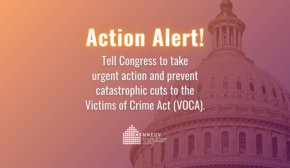Meet the Louisiana Coalition Against Domestic Violence
Through this regular feature, the National Network to End Domestic Violence (NNEDV) will be introducing you to our member coalitions. Read the rest of our Meet A Coalition features here.
Meet the Louisiana Coalition Against Domestic Violence:

What is it like to do domestic violence work in Louisiana?
Domestic violence work in Louisiana is certainly never boring. We do this work in the face of some staggering statistics: Louisiana ranks 3rd in the nation for the rate of women murdered by men, we have one of the worst gender pay gaps in the nation, our incarceration rate is the highest in the nation, and more than 1 in 4 children in Louisiana live in poverty. Yet our coalition of diverse, energetic, and hardworking advocates makes meaningful progress every day toward a safer Louisiana. Our work is bolstered by the strength of our partnerships, the dedication of our advocates, and the passion of our supporters and champions. It is work filled with highs and lows, and the steady tempo of progress in between. It is nothing short of an honor to do this work in Louisiana.
What impact does your Louisiana context have on this work?
Louisiana is an exceptionally unique state, both geographically and culturally. We have a healthy mix of rural communities and large urban areas, each with their own challenges to overcome. Doing domestic violence work at the coalition level requires us to understand and work within the complexities of our state, and to leverage those complexities for the benefit of survivors. While Louisiana has a long history of colonialism and oppression, it also has a rich history of grassroots social justice efforts that provide context and meaning to the work we do.
What are the biggest barriers that survivors face in Louisiana?
Louisiana lacks appropriate funding for domestic violence services, leaving large geographic areas of our state without meaningful access to shelter, advocacy, or civil legal services. Despite the incredible work of local domestic violence programs to meet the need, many of the barriers survivors face in our state boil down to a lack of resources for services, training, and prevention work. Louisiana also lacks sufficient affordable housing and childcare, providing very concrete barriers to safety for many survivors of domestic violence.
What’s happening in Louisiana that you’re excited about? Proud of?
Last year, our legislative efforts helped secure the passage of new state laws expanding domestic violence protections to dating partners and survivors in same-sex relationships. Prior to this work, we were one of only two states that explicitly limited our criminal domestic abuse statute to opposite-sex relationships (More: http://lcadv.org/advocates-applaud-passage-of-bills-expanding-domestic-violence-protections/). These hard-fought victories encourage and energize us for the work ahead.
We also recently produced and launched a series of web videos advertising our statewide domestic violence hotline. In addition to advertising the hotline, the videos gave us an opportunity to provide education about financial abuse and cyberstalking. You can view these here: http://lcadv.org/hotline-videos/.
Are there any champions in Louisiana that you’d like to thank or celebrate for their record or work on domestic violence?
We are fortunate to have many supportive legislators and allies in our state that have helped us make progress toward a Louisiana free of violence. But our true champions are the advocates who work in local domestic violence programs across our state. Their daily dedication to survivors and commitment to making our state a safer place is an inspiration.
How is LCADV working to end domestic violence?
LCADV is dedicated to bringing about change in our institutions, laws, politics, attitudes, and beliefs which will allow individuals to live free of violence. We work to end domestic violence through education, systems advocacy, public policy, and social change. Our work is centered in feminist principles of anti-oppression and self-determination. We believe that we can make the most progress toward ending domestic violence when we form innovative and meaningful partnerships with those who share our vision and challenge us to expand our approaches to this work.
If LCADV was a musician or music group, who would you be and why?
This question truly illustrated the diversity of our staff! They suggested everything from Prince, to The Beatles, to the Jackson Five, to the Philharmonic Orchestra. The common theme: music groups that emphasize overcoming adversity and bring together diverse members to create a lasting legacy better than any one member could do alone.
Is there anything else you’d like to add? Anything we didn’t ask that you’d like to share?
Thanks for taking time to learn about us and our work! We are excited for the opportunity to share our passion for making Louisiana a safer place.
Learn more about LCADV:
- Website: www.lcadv.org
- Facebook: facebook.com/lcadv
- Twitter: twitter.com/lcadv
- Instagram: Instagram.com/lcadv





